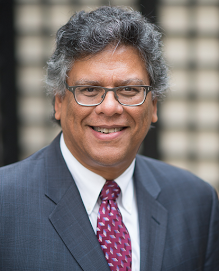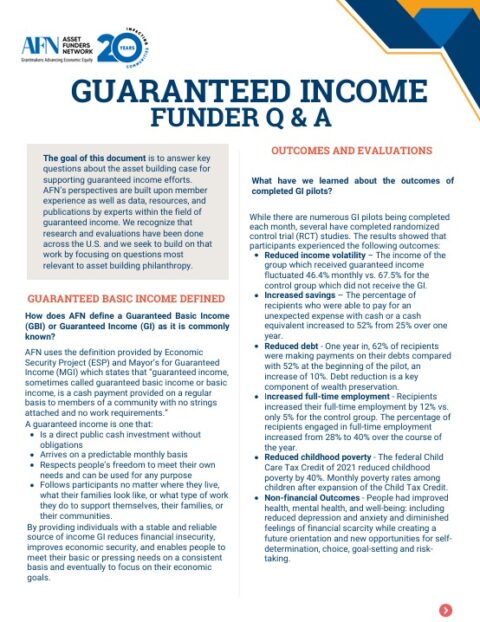 FROM THE PRESIDENT AND CEO
FROM THE PRESIDENT AND CEO
SEPTEMBER 2021
AFN’s mission is engaging philanthropy to strengthen the economy into an equitable economy, regardless of a person’s race, ethnicity, or gender, in ways that increase security and intergenerational mobility. The challenge we face is how to grow investments to activate the necessary internal changes, public and private investments, community-based interventions, and innovations that intentionally move us aggressively to the goal by addressing policies, practices, legacies of discrimination and structural gaslighting.
Racism and sexism both structure opportunity and assign value, based on social or cultural norms, that we experience to inform beliefs and judgments reflecting implicit or explicit bias. These structures purposefully disadvantage some individuals and communities while unfairly advantaging others, wasting resources, potential, and devaluing humans who are “othered.”
We all know this; yet too many voices and “leaders” in this country pontificate and assert that opportunity is available for all who wish to take it, to justify their advocacy for solutions that deny race, or ethnicity, or gender as a systemic construct in this economy. Not surprisingly, those voices and “leaders” are overwhelmingly from persons who are very privileged and have power.
They are engaging in a deeply rooted method of protecting the status quo and its unfair structural disadvantages and advantages, i.e. by practicing systemic gaslighting. Many of you know the term gaslighting comes from Patrick Hamilton’s 1938 play, Gaslight, where the husband abuses his wife by progressively dimming the gas lights in their home and, then, when she comments on the dimness and growing darkness, denies her accurate observation to undermine her confidence in her own observations, enabling him to eventually demonstrate her insanity. Every time someone engages in systemic gaslighting they do this to reinforce systemic discriminatory injustice. The practice gets many to question an injustice that they are made aware of or observed, and instead provides a racist or sexist explanation so they can refuse to acknowledge or believe the injustice is happening.
In your work and that of your grantees, do you recognize and attack gaslighting when it is part of the structural discrimination in our economy?
Structural gaslighting is real. To combat it, we need to recognize it and intentionally, purposefully attack and undo it. Consider:
- When Black, Latinx, Asian and Pacific Islander families are given low appraisals for their home or denied home improvement loans because of their race or ethnicity, gaslighting blames their race for a credit profile that is too risky, regardless of the community, income, or credit score. Thus, the failure to improve the home is chalked up to the race or ethnicity of the owner.
- When Black, Latinx, Indigenous and Pacific Islander youth disproportionately are targeted by police for stop and frisk without cause, gaslighting explains it is to stop or reduce crime when it does not. And when those youth of color have arrest records, gaslighting compounds the injustice by allowing employers to deny a job, a college to deny a scholarship, or a landlord to deny housing, because the youth were criminally engaged.
- When women who are small business owners, especially those who are Black and Latinx, are denied loans to build their business, structural gaslighting explains that these owners are unlikely to succeed and thus an investment or loan is too risky. Of course, denying the investment often makes this a self-fulfilling result.
- When Black, Latinx and Asian consumers or hospital patients are twice as likely as their white counterparts to be sued in debt collection cases that result in default judgments, the gaslighting is that they were bad consumers spending frivolously and not that they were subject to predatory schemes or were targets of poor insurance or unscrupulous debt collectors.
Racism and sexism in this country thrive when structural gaslighting is left unchecked.
At AFN, we believe the challenge for funders is to do what is needed to break the gaslighting cycles. Achieving the goal of an equitable economy creates pathways for individual agency and creativity—honoring the goal to realize every child’s potential—and creates many paths to achieve economic security and to engage in asset, or wealth, building. Obviously, funding interventions is incredibly valuable— it proves concepts, provides needed evidence, informs systemic change and makes a difference for persons and communities that are impacted. But, if we are to achieve an equitable economy, these investments need to be coupled with funding for narrative change, research, and advocacy designed to counter structural gaslighting. Each investment may require patience and learning from failure or being iterative in evolving the strategy to get leaders across sectors of all races, ethnicities, and genders to denounce the gaslighting with purpose and clarity.
We have a lot to do to achieve a multi-generational equitable economy where wealth is transferred to new generations regardless of one’s race, ethnicity, gender, sexual orientation, or any characteristic used for social or cultural “othering.”
Join the many voices at AFN that fund and seek to gain new colleagues in this mission. If you are in a community that does not yet sustain an AFN chapter, let’s work to develop one.


